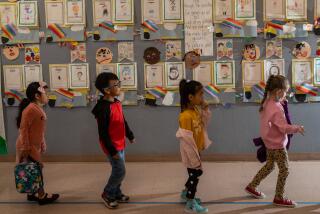EDUCATION : Pass the Word--A Strong Vocabulary Is the Key to Success
- Share via
The importance of a strong vocabulary for children cannot be overstated. Students with the best vocabulary perform the best in college entrance exams and job interviews, and well-spoken people also have the upper hand in almost every imaginable social situation.
Grade school is the best time to start helping your child develop language skills. There are many ways that you can do this while having fun and strengthening your bond with your grade-school child.
The easiest and most important way to enlarge your child’s vocabulary is by taking turns reading out loud, said Ilene Rotenberg, a teacher at Westminster Computer Magnet School in Venice. “It sounds obvious,” Rotenberg said, “but so many parents don’t do it.”
Before reading together, pull out all of the words that you think your child may not know and go over them. This way the student will read smoothly and confidently without stumbling over unfamiliar words.
To find out which words you can expect your child to know, ask his or her teacher for a copy of the Dolch List, which contains 220 words that are most vital for reading in primary grades. The list contains 76% of the words used in first-grade books, 69% of those in second-grade books and 62% of the words in third-grade books.
The list of 300 “Instant Words,” edited by Edward Fry, is also useful because it has about 65% of words read by children and adults. Amazingly, just the first 10 words on the list represent about a quarter of all printed English words.
Make sure you have age-appropriate reading materials in the home. There are many magazines published just for children, but a favorite among Rotenberg’s fifth- and sixth-graders is “Stone Soup.”
“It’s all written by children, all the articles, stories and poetry, and the art as well,” she said. “Highlight” and “Cricket,” which carry stories and word puzzles for elementary school children, are also popular.
One of the best resources for expanding your child’s vocabulary is the newspaper. It offers a variety of topics that children like, such as comics, horoscopes, sports play-by-plays and album charts. “You can make a game out of the newspaper,” Rotenberg said. “I have my students read the want ads and I ask them to find me a new car or a job.”
To help your student decipher words, keep a children’s dictionary handy. Bookstores usually carry a variety of colorful and widely differing “beginner’s” dictionaries, so choose the one your child seems most interested in.
Computer software is a powerful tool for vocabulary-building, and there are dozens of inexpensive educational packages. Many adventure programs are also good linguistic workouts because they make the child learn to follow directions, recognize word clues, and detect double or hidden meanings.
Kristin Cady, a fifth-grader at Grant Elementary School in Santa Monica, has learned more than a hundred words from the “Reading Rabbit” software program, which features word games. “It’s fun and it makes me more interested in reading and learning words,” Kristin said. “If you do things right, the little rabbit dances and it’s really funny.”
“If you want kids to learn words, it has to be a game,” said Kristin’s father, Patrick Cady, a teacher at Santa Monica High. “Words have got to be seen as friends and tools, as well as academic.” He suggested playing some simple word games with your child to make new words seem more friendly.
Crossword puzzles are probably the most popular word game in America, and are very easy to find. Bookstores carry volumes and weekly magazines are full of them, and The Times provides one every day. Crosswords are great for learning synonyms and spelling.
A game called “Wordsearch” is also fun and easy to play. Write down some words that you want your child to learn, then add extra letters before and after each word. By circling the hidden word, your student can quicken his or her ability to recognize and spell words.
Finally, “Wheel of Fortune,” minus Vanna’s evening gowns and Pat’s jokes, is actually a good exercise in vocabulary-building. Along with the contestants, your child can guess and spell the secret word or phrase. “Wheel” can help your kid practice spelling, separating vowels from consonants and classifying words.
Educators and business leaders agree that vocabulary can affect your child’s ability to get good grades, admission to college and the right job. Make sure your child develops a vocabulary that provides him or her with a competitive edge.
More to Read
Sign up for Essential California
The most important California stories and recommendations in your inbox every morning.
You may occasionally receive promotional content from the Los Angeles Times.












